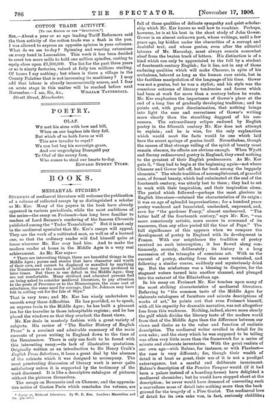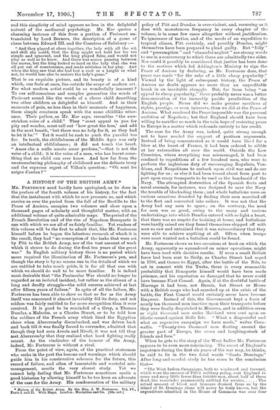BOOKS.
MEDIAEVAL STUDIES.*
STUDENTS of mediaeval literature will welcome the publication of a volume of collected essays by so distinguished a scholar as Mr. Ker. Many of the papers in the book have already appeared in various periodicals, while the most ambitious of the series—the essay on Froissart—bas long been familiar to readers of Lord Berners's rendering of the famous Chronicle published among the " Tudor Translations." But it is not only to the mediaeval specialist that Mr. Kees essays will appeal. They are the work of a cultivated man, as well as of a learned one, so that the ordinary reader will find himself quite at
home wherever Mr. Ker may lead him. And to make the modern reader at home in the Middle Ages is a very real achievement. As Mr. Ker says-
" There are interesting things, there are beautiful things in the Middle Ages ; poems and stories that have character and worth of their own, and cannot be displaced or annulled by anything the Renaissance or the march of intellect may have produced in later times. But there is one defect in the Middle Ages ; they are not comfortable. Many civilised and educated persons feel on being asked to consider medieval literature, to pay attention to the poets of Provence or to the Minnesingers, the same sort of reluctance, the same need for courage, that Dr. Johnson may have felt in setting out for the Isle of Skye."
That is very true ; and Mr. Ker has wisely undertaken to smooth away these difficulties. He has provided, so to speak, an express train to the Middle Ages ; he has built a pleasant inn for the traveller in those inhospitable regions; and he has placed the windows so that they overlook the finest views.
Mr. Ker deals in masterly fashion with a great variety of subjects. His review of " The Earlier History of English Prose" is a succinct and admirable summary of the main currents of prose writing in England down to the time of the Renaissance. There is only one fault to be found with this interesting essay, its lack of illustrative quotations. Originally written as an introduction to Sir Henry Craik's English Prose Selections, it loses a great deal by the absence of the extracts which it was designed to accompany. The most penetrating discussion of literary work is never quite satisfactory unless it is supported by the testimony of the
work discussed. It is like a descriptive catalogue of pictures without the pictures themselves.
The essays on Boccaccio and on Chaucer, and the apprecia- tive notice of Gaston Paris which concludes the volume, are
• E.ssays on Medieval Literature. By W. P. Ker. London: Damn-Man and Co. [5s. net.1 full of those qualities of delicate sympathy and quiet scholar- ship which Mr. Ker knows so well how to combine. Perhaps, however, he is at his best in the short study of John Gower. Gower is an almost unknown poet, whose writings, until a few years ago, lay hidden under the obscurities of a corrupt and doubtful text, and whose genius, even after the editorial labours of Mr. Macaulay, must always remain somewhat aloof from the beaten track of letters. His distinction is of a kind which can only be appreciated to the full by a student of fourteenth-century English ; for it lies, not in any of those enduring qualities which will make Chaucer, in spite of his archaisms, beloved as long as the human race exists, but in the faultless manipulation of the language of his time. Gower was not a genius, but he was a stylist; and his style was the conscious outcome of literary tendencies and forces which had been at work for more than a mutiny before he wrote. Mr. Ker emphasises the importance of Gower's place at the end of a long line of gradually developing tradition; and he points out, with great discrimination, that nothing brings into light the ease and correctness of Gower's writing more clearly than the stumbling doggerel of his suc- cessors. The extraordinary eclipse endured by English poetry in the fifteenth century Mr. Ker does not attempt to explain ; and he is wise, for the only explanation which would meet the facts would be one which laid bare the secret springs of genius itself. Nevertheless, though the causes of that strange veiling of the spirit of beauty must remain obscure, its effects are obvious enough. When Wyatt and Surrey rediscovered poetry in England, they owed nothing. to the greatest of their English predecessors. As Mr. Ker puts it, " they had to begin at the beginning again—not where Chaucer and Gower left off, but far back among the beggarly elements." The whole tradition of accomplishment, of graceful ease, of formal beauty, which had culminated at the end of the fourteenth century, was utterly lost to them ; they had to set to work with their inspiration, and their inspiration alone. The period which followed—perhaps the most glorious in English literature—retained the characteristics of its origin : it was an age of splendid improvisations ; for a hundred years poetry wandered and luxuriated, unchecked, unpruned, and, save for " the gardener Fancy," almost unobserved. " The latter half of the fourteenth century," says Mr. Ker, "was more consciously artistic, more secure in command of its resources, than any other period till the time of Pope." The full significance of this appears when we compare the development of poetry in England with its development in France. With our neighbours the tradition of poetry received no such interruption ; it has flowed along con- tinuously, securely, deliberately ; its history is a long succession of the triumphs of conscious art. With us the current of poetry, starting from the same watershed, and following a similar course, suddenly and mysteriously dried up. But the misfortune was a blessing in disguise, for the stagnant waters turned into another channel, and plunged. into the cataract of the Elizabethan age.
In his essay on Froissart Mr. Ker touches upon many of the most striking characteristics of mediaeval literature. Referring to "the common taste of the Middle Ages for elaborate catalogues of furniture and minute descriptions of works of art," he points out that even Froissart himself, with all his capacity for dramatic narrative, was not altogether free from this weakness. Nothing, indeed, shows more clearly the gulf which divides the literary taste of the modern world from that of the Middle Ages than the difference between our views and theirs as to the value and function of realistic description. The mediaeval writer revelled in detail for its own sake; and the story which he was supposed. to be telling was often very little more than the framework for a series of minute and elaborate inventories. With the great realists of our own age—with Balzac, for instance, or with Flaubert— the case is very different; for, though their wealth of detail is at least as great, their use of it is not a prodigal extravagance, but a careful and deliberate investment. Balzac's description of the Pension Vauquer would (if it had been a palace instead of a boarding-house) have delighted a mediaeval chronicler; but he would have stopped short at the description; he never would have dreamed of converting such a marvellous mass of detail into nothing more than the bank ground for the tragedy of a Pere G-oriot. The mediaeval love of detail for its own sake was, in fact, curiously childlike;
and this simplicity of mind appears no less in the delightful naivete of the mediaeval psychology. Mr. Ker quotes a charming instance of this from a portion of Froissart un- translated by Lord Berners, the description of a game of chess between Edward III. and the Countess of Salisbury :-
" And they played at chess together, the lady with all the wit and skill she could, that the king might not hold her for too simple and ignorant, and the king played false, and would not play as well as he knew. And there was scarce pausing between the moves, but the king looked so hard on the lady that she was all put out of countenance, and made mistakes in her play. And when the king saw that she had lost a rook or a knight or what not, he would lose also to restore the lady's game."
That is an exquisite picture, and its beauty is of a kind which, one feels at once, lies outside the scope of modern art.
For what modern artist could be so wonderfully innocent ? To our self-conscious and complex generation the words of Froissart sound like the words of a clever child describing two other children as delightful as himself. And in their moments of pain, no less than in their moments of happiness, these simple creatures speak with the same childlike utter- ance. Their pathos, as Mr. Ker says, resembles " the awe- stricken voice of a child." They " must appeal to you for pity and wonder, must call out how great the loss,' and add in the next breath, but there was no help for it, so they had to let it be.'" Yet it would be rash to push the parallel too far. In truth, the childishness of the Middle Ages was only an intellectual childishness ; it did not touch the heart. " Amor the a nullo amato amar perdona,"—that is not the voice of a child ; it is the voice of a man, who has learnt some- thing that no child can ever know. And how far from the unremembering philosophy of childhood are the delicate irony and the supreme regret of Villon's question : " Oh sent lee neiges d'antan "



























































 Previous page
Previous page